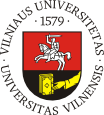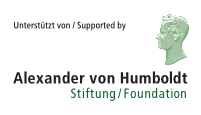Alexander von Humboldt Forum
Science & Society in Modern Europe
Dedicated to Millenium of Lithuania and 50 Years of the Laser
September 23-26, 2010, Vilnius, Lithuania
Sponsored by
Welcome to Alexander von Humboldt Forum 2010 in Vilnius, Lithuania!
The Forum on Science and Society in Modern Europe is organized in the frames of the Program "Humboldt Kollegs" founded by Alexander von Humboldt Foundation (AvHF) aiming to strengthen regional and professional networking covering broad spectrum of science and humanities and involving transdisciplinary subjects.
This particular Forum features the subjects of philosophy, modern chemistry and laser science the fields being under strong development in Lithuania and having tight links with AvHF alumni. Moreover, we take the nice opportunity to be a concluding part of Lithuania's Millenium celebration and to mark the first half century of the Laser and celebrate the history of one of the most significant discoveries of the 20th century. We are excited to offer a total of 46 plenary and invited talks and 29 poster presentations by some of the most respected researchers in our international community and young scientists as well.
We would like to thank Organizing and Program Committee Co-Chairs Gediminas Juzeliūnas, Zenonas Norkus and Audrius Maruška as well as all AvHF alumni in Lithuania for putting together this colourful and excellent program. We would like also to thank the Sponsoring Institutions and Societies and particularly Alexander von Humboldt Foundation and Scientific Council of Lithuania for their substantial support and contributions to the meeting. Finally, we thank Dalia Kaškelytė, Julius Ruseckas and the staff of Physic Faculty, Institute of Theoretical Physics and Astronomy, Department of Quantum Electronics and Laser Research Center of Vilnius University for their professional assistance and excellent job in organizing this event.
We welcome you to the Forum and thank you for your participation.
Benediktas Juodka and Algis P. Piskarskas
Forum Co-Chairs
Welcome to Vilnius

The capital of Lithuania was first mentioned in written sources of the 12th century. It becomes famous after the invitation letter written by Gediminas, the Grand Duke from 1316, to German merchants. And in 1323 Vilnius was named as a city and was given Magdeburg Rights. The prosperity of Vilnius city is symbolized by a legend about a dream of the Grand Duke Gediminas, in which he saw a roaring iron wolf on one of the numerous Vilnius hills. The oldest prophet explained the dream to the ruler as meaning that the town's reputation would spread far and wide.
Nature and the harmonious totality of its elements played a strong determining role in the expansion and inner structure of this city. Old Vilnius emerged over hundreds of years, expanding, changing, and embodying the creative imagination and experience of many generations of architects and builders from Lithuania and abroad; under the care of generous and perceptive benefactors, it became a city rich in architectural treasures and urban harmony.
In the 16th century, the Lithuanian Rulers' Palace was a famous hearth of science and culture with treasures that, according to a Papal Nuncio in 1560, were hardly surpassed by the treasures of Venice and the Vatican. One of the greatest scientific libraries was established there. Later the books were handed over to the Jesuit Collegium, founded in 1570, and finally to the library of Vilnius University (the first university in Eastern Europe founded in 1579). Throughout a couple of centuries, Vilnius became a constantly growing and developing city, due in large part to the establishment of Vilnius University. The first university of this type in the Grand Duchy of Lithuania, it soon developed into an important scientific and cultural center of Europe. Functioning for a long time as the only school of higher learning in Lithuania, it was a preserver of cultural and scientific traditions, and has played a significant part in the cultural life not only of Lithuania, but the neighbouring countries as well. During more than four centuries of its existence, the Vilnius University has seen periods of growth and decline, revival, and closure. The University is a unique witness to the history of the Lithuanian state.
Lithuania has now gained world-wide recognition. It became a member of NATO (on 2nd April, 2004) and as well as a member of EU (on 1st May, 2004). The Old Town of Vilnius is among the most prominent monuments of culture in the world and has been involved into the World Heritage Register of UNESCO.
Contacts
- Dalia.Kaskelyte@ff.vu.lt, tel. +370 5 236 6014
- Algis.Piskarskas@ff.vu.lt, tel. +370 5 236 6051
- Gediminas.Juzeliunas@tfai.vu.lt, tel. +370 5 219 3255
- Zenonas.Norkus@fsf.vu.lt, tel. +370 5 266 7603
- A.Maruska@gmf.vdu.lt





